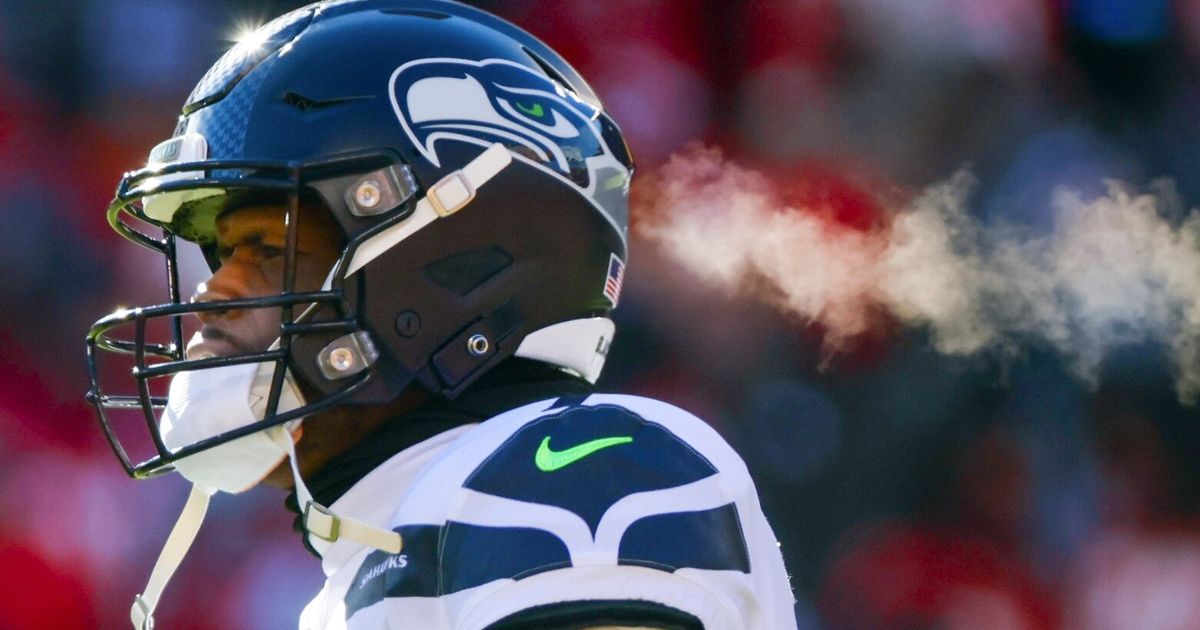
Will the Seahawks use the franchise tag on free agent quarterback Geno Smith?
That question, which has been hovering over the Seahawks for months, will finally get an answer by Tuesday.
Specifically, teams have until Tuesday at 1 p.m. PT to decide to place a tag on a player.
A tag means a player gets a contract for the 2023 season at a predetermined salary that is an average of the top five salaries at the player’s position over the last five years or 120% of his previous salary, whichever is greater.
In Smith’s case, if Seattle used the nonexclusive tag, generally viewed as the most likely, Smith would get $32.4 million in 2023.
Tags also allow teams to have a right or first refusal and/or compensation if a tagged player agrees to a contract with another team. Tagged players can negotiate with other teams until they sign the tender, at which point the salary becomes fully guaranteed.
If Smith were given the nonexclusive tag, he could continue to talk to other teams, but the Seahawks could match any offer and receive two first-round draft picks as compensation if he signed elsewhere, which makes it unlikely any team would make him an offer.
Teams can continue to negotiate with their own tagged player until July 17, after which, a player can only play on the tag. Teams can only tag one player a year, and the minute the tag is signed, the salary becomes fully guaranteed (teams also can rescind tags, though that has rarely happened).
If a player does play on the tag, the entire salary goes on the team’s cap for that season, one reason few think Smith would actually play on the tag.
Seattle could also use the cheaper transition tag, which for a quarterback means a salary of $29.5 million. But that tag only gives teams right-of-first refusal and not any potential draft pick compensation.
When Seahawks general manager John Schneider talked to reporters last week at the NFL scouting combine, he declined to answer whether Seattle might use the tag on Smith.
Seattle has rarely used the tag since Schneider arrived in 2010, most recently on defensive end Frank Clark in 2019. The Seahawks traded Clark to the Chiefs shortly before the draft that year when they were unable to work out a long-term contract.
Last year, four of eight tagged players signed new, long-term deals with their teams, which is generally the preferred outcome for both sides, and likely would be with Seattle and Smith.
The Seahawks wouldn’t want to take on all that cap in 2023 if they can avoid it, and Smith, who has played on nothing but one-year contracts since his rookie deal with the Jets ran out in 2017, surely wants more security, and also undoubtedly more overall money.
And that means in essence, using the tag would be a way for Seattle to avoid letting Smith hit free agency — the negotiating period begins next Monday with players able to sign with new teams on March 15 — and buy some time to continue working out a longer-team deal.
The tag would by itself almost double what Smith has so far earned in his career, calculated by OvertheCap.com at $17.5 million.
What is Smith looking for and what might the Seahawks be willing to give him?
Those have been closely-guarded secrets so far.
One hint came Monday morning in a report from SI.com’s Albert Breer that Seattle’s offer to Smith “isn’t in the neighborhood” of the $35-39 million that the Giants reportedly have on the table for Daniel Jones (Jones is said to want $40 million a year or more).
Breer wrote further that “it stands to reason that Smith should wait to see if the Seahawks tag him Tuesday, and if not maybe test the market.”
Breer wrote the first big quarterback free agent domino fell as Derek Carr agreed to a deal with the Saints reportedly paying him up to $150 million over four years with $100 million in total guarantees and $60 million at signing.
Smith may see that deal — not only the average of $37.5 million but a bonus more than triple what he has already made in the NFL and also basically be about double of the tag — as at least the floor for what he would want from Seattle.
Carr, who turns 32 later this month, is only about six months younger than Smith. And while Smith led the NFL in completion percentage in 2022 at 69.8%, Carr was benched by the Raiders and eventually released last month.
Schneider said at the combine last week that negotiations with Smith were progressing.
“I would say positive,” Schneider said of the talks. “All these negotiations, some go a little bit faster than others. Usually when you’re talking about larger numbers, they take a little bit more time. Obviously much more complex than different sports with guaranteed contracts. So there’s a lot more that goes into these contracts.”
And for another 24 hours or so, the tag remains a potential factor in those negotiations.
As of Monday morning, three players were reported as getting the tag — Dallas running back Tony Pollard, Washington defensive tackle Daron Payne and Jacksonville tight end Evan Engram.